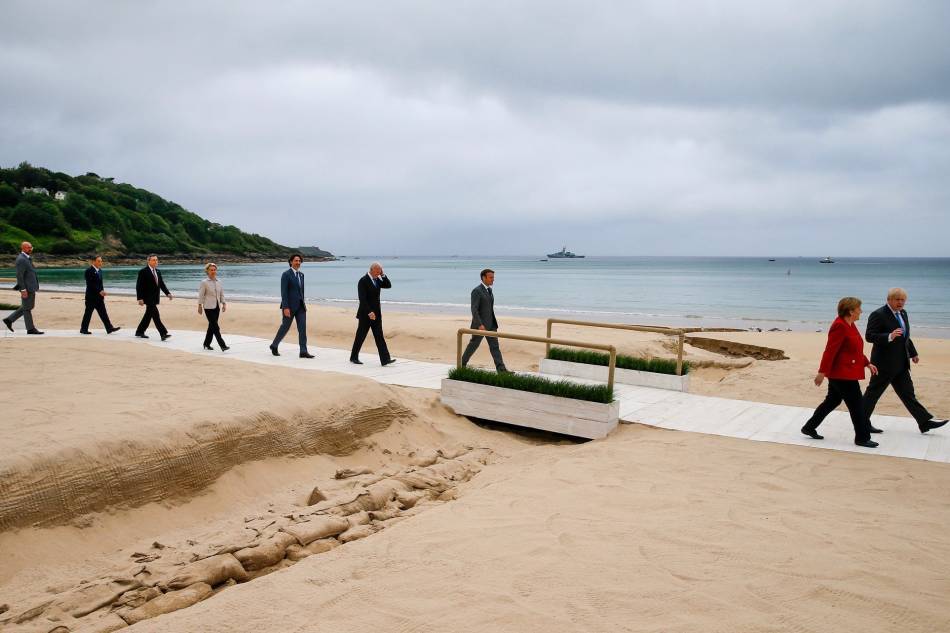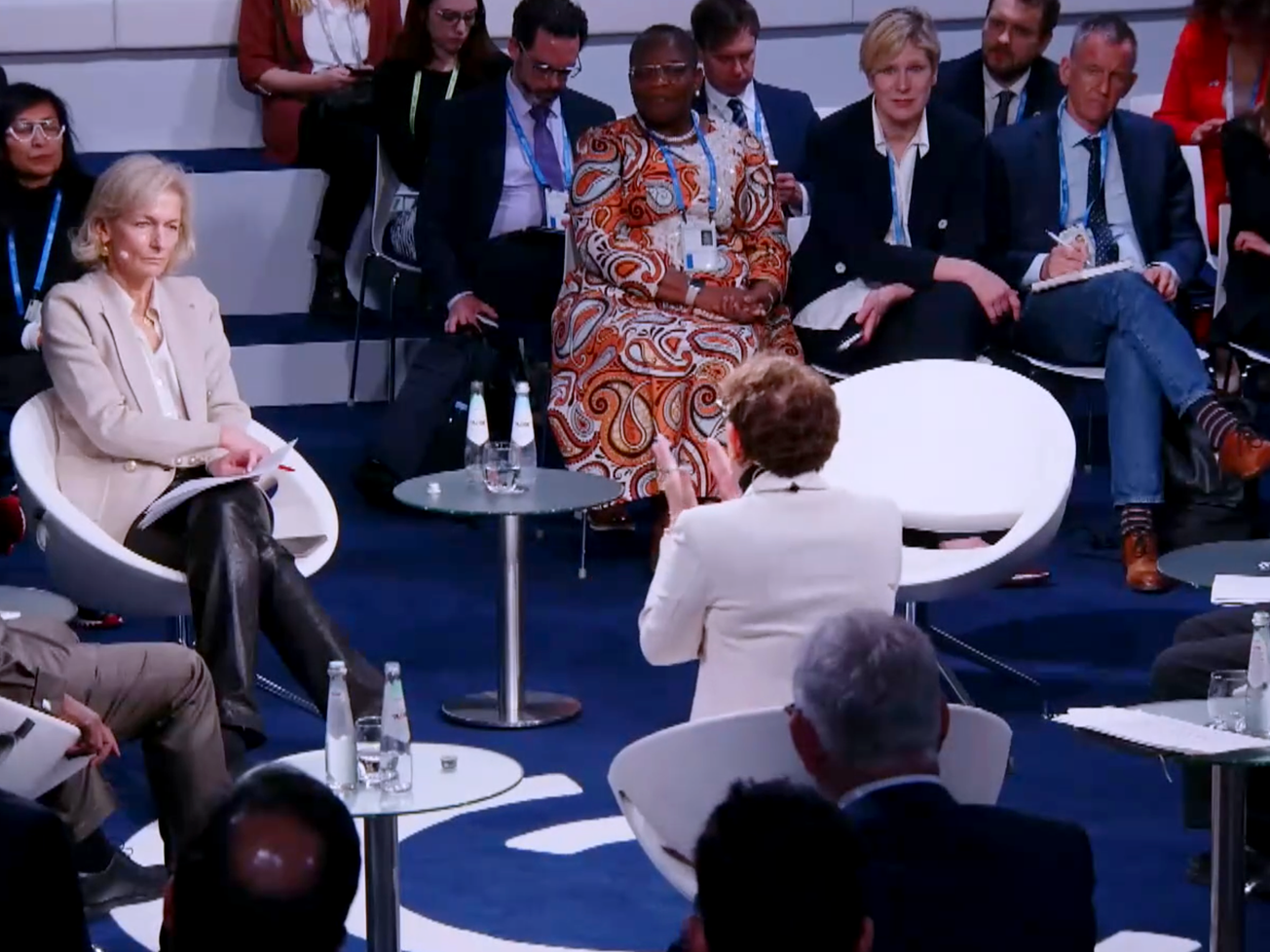LONDON (AN) —The Group of Seven summit wrapped up on Sunday vowing to end the COVID-19 pandemic, fight climate change and incorporate U.S. President Joe Biden's pledge to “build back better” on a global scale.
Promises to provide 1 billion more coronavirus vaccine doses, address China's human rights record and step up efforts to combat corruption, ransomware attacks and forced labor in global supply chains also were priorities in the United Kingdom-hosted G-7 summit’s traditional, final communiqué, a 25-page document negotiated over three days of meetings along Carbis Bay in Cornwall, England.
The G-7 group of the wealthiest large democracies said its "commitments since the start of the pandemic provide for a total of over 2 billion vaccine doses, with the commitments since we last met in February 2021, including here in Carbis Bay, providing for 1 billion doses over the next year" to the developing world.
Included in that tally were Biden's promise for the U.S. to purchase 500 million Pfizer-BioNTech doses and U.K. Prime Minister Boris Johnson's pledge for Britain to donate 100 million doses.
French President Emmanuel Macron vowed to double his nation's previous promise of 30 million doses by the end of the year, while Canada pledged another 13 million on top of the 87 million it provided for through donations to the COVAX Facility for global vaccine access, co-led by the World Health Organization, Gavi, the Vaccine Alliance, and the Coalition for Epidemic Preparedness Innovations.
"United as open societies and economies and guided by our shared values of democracy, freedom, equality, the rule of law and respect for human rights, we commit to beating COVID-19 everywhere and building back better for all," leaders of Britain, Canada, France, Germany, Italy, Japan and the United States agreed.
"Our agenda for global action is built on our commitment to international cooperation, multilateralism and an open, resilient, rules-based world order," they said. "As democratic societies we support global institutions in their efforts to protect human rights, respect the rule of law, advance gender equality, manage tensions between states, address conflict, instability and climate change, and share prosperity through trade and investment."
WHO Director-General Tedros Adhanom Ghebreyesus told G-7 leaders he welcomed the vaccine pledges, but it is not enough.
"To truly end the pandemic, our goal must be to vaccinate at least 70% of the world’s population by the time you meet again in Germany next year. This can be done with the support of the G-7 and G-20, together," he said in his opening remarks, referring to the Group of 20 major economies. "To do that, we need 11 billion doses. We welcome the generous announcements you have made about donations of vaccines. Thank you. But we need more, and we need them faster."
Johnson played host to the summit, giving him an opportunity to plug his post-Brexit vision of a "Global Britain." However, British demands for an E.U. trade deal that would inflame tensions over the U.K.'s Northern Ireland and the E.U.'s Ireland put Johnson at cross purposes with the European Union and United States.
Johnson's threat to suspend the Northern Ireland Protocol led to a clash with French President Emmanuel Macron, who insisted the U.K. must abide by terms of its 2019 Brexit deal with the E.U. Johnson also found himself at odds with Biden, who urged the British leader to uphold the protocol.
In addition to ensuring the region can follow many of the E.U. trade rules, the protocol serves to protect the 1998 Good Friday Agreement that ended decades of sectarian violence in Northern Ireland.
Joining the exclusive G-7 gathering at the Carbis Bay seaside resort, along the Cornwall coast of England, were leaders from Australia, the E.U., India, South Africa and South Korea.
G7 leaders have agreed a shared agenda for global action to #BuildBackBetter together.
— G7 GER (@G7) June 13, 2021
Read the Carbis Bay G7 Summit Communiqué 👇https://t.co/weGcoJlvd2
🇬🇧 🇨🇦 🇫🇷 🇩🇪 🇮🇹 🇯🇵 🇺🇸 🇪🇺#G7UK
G7 in action. pic.twitter.com/ihkBLAjsmx
— Emmanuel Macron (@EmmanuelMacron) June 13, 2021
'Back at the table'
The G-7 leaders, whose nations are responsible for about a quarter of all carbon emissions, pledged to collectively reduce that output by 2030, but stopped short of fixing a deadline for the elimination of coal-fired power plants, a major source of industrial warming gases and particle pollution. That will likely undercut any leverage they might have in negotiating an end to China's major reliance on coal.
"To lead us out of the climate emergency, the G-7 needed to deliver clear plans to quickly phase out fossil fuels and commitments to immediately stop all new fossil fuel development with a just transition," Jennifer Morgan, Greenpeace International's executive director, said. "Where is the clear national implementation with deadlines and where is the climate finance so urgently needed for the most vulnerable countries?"
After the summit, Biden held a news conference at Cornwall Airport Newquay before flying to London where he and first lady Jill Biden were scheduled to meet with Queen Elizabeth II at Windsor Castle. The Bidens then traveled on to Brussels for two days of talks with NATO and E.U. officials.
Biden made clear the United States no longer is driven by the “America First” policies of his predecessor, former President Donald Trump, and that his fellow leaders appreciated America's return to traditional engagement through diplomacy and multilateralism.
"I conveyed to each of my G-7 counterparts the U.S. is going to do our part. America is back to the table," Biden said. "The lack of participation in the past and full engagement was noticed significantly, not only by the leaders of those countries but by the people in the G-7 countries."
The G-7 statement reflected Biden's call for leaders to offer a collective alternative to China's global Belt and Road Initiative, which expanded its influence among indebted nations that accept its development funding, and to confront China's use of forced labor in the northwestern Xinjiang Province, where authorities detained more than 1 million people in a crackdown on Muslim Uyghurs.
The G-7 also voiced strong concerns over China's agressive claims in the South China Sea aimed at challenging the United States as a global power.
"With regard to China, and competition in the global economy, we will continue to consult on collective approaches to challenging non-market policies and practices which undermine the fair and transparent operation of the global economy," the leaders said.
"We will promote our values," they said, "including by calling on China to respect human rights and fundamental freedoms, especially in relation to Xinjiang and those rights, freedoms and high degree of autonomy for Hong Kong enshrined in the Sino-British Joint Declaration and the Basic Law."







